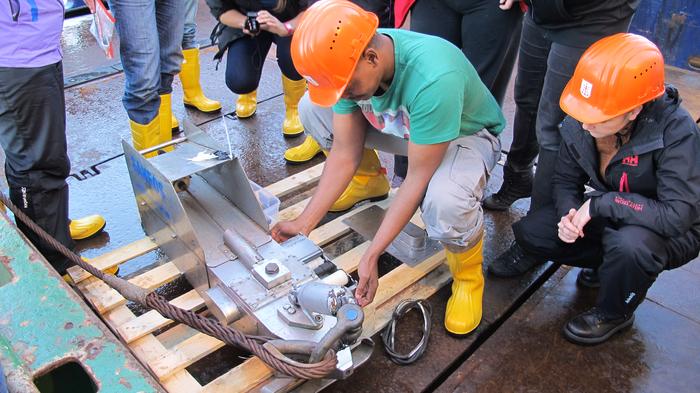A decade of excellence: Over the past ten years 100 scholars from 47 countries to become experts in marine science were trained at the Alfred Wegener Institute. This highly effective programme funded by the Nippon Foundation and the Partnership for Observation of the Global Oceans (POGO) and the Alfred Wegener Institute is successfully completed. This is a perfect occasion to celebrate all candidates and their teachers, and the graduation of the ten current participants from ten different countries in Berlin at the Museum für Naturkunde – Leibniz Institute for Evolution and Biodiversity Science.

Credit: Alfred Wegener Institute / Philipp Wenta
A decade of excellence: Over the past ten years 100 scholars from 47 countries to become experts in marine science were trained at the Alfred Wegener Institute. This highly effective programme funded by the Nippon Foundation and the Partnership for Observation of the Global Oceans (POGO) and the Alfred Wegener Institute is successfully completed. This is a perfect occasion to celebrate all candidates and their teachers, and the graduation of the ten current participants from ten different countries in Berlin at the Museum für Naturkunde – Leibniz Institute for Evolution and Biodiversity Science.
On 25 April 2024, in the tenth year of the Centre of Excellence, ten scholars will celebrate their graduation with all the teachers, organisers and other previous graduates at the Museum für Naturkunde in Berlin. This event celebrates and highlights ten highly effective years of CofE training at the Alfred Wegener Institute, Helmholtz Centre for Polar and Marine Research (AWI). It will serve as a thanks to all of the high-level teachers and supporters from all over the world who kindly gave ten years of their time and expertise to provide excellent international education. Approximately 70 alumni and 50 teachers and supporters from over 40 countries are expected to attend the celebrations. They will meet with the current class on 24th April at the AWI Research Centre in Potsdam to develop joint ideas in the workshop “Ocean research in a community-driven approach”. During this UN Ocean Decade activity alumni will discuss in four breakout groups the use and application of low-cost marine sensors; outreach beyond cultural and educational boundaries; the initialization of a female support network within the alumni community; as well as the synchronisation of long and short-term data in coastal environments. The breakout groups will be chaired by alumni of the CofE.
The programme of the evening event at the Museum für Naturkunde –Leibniz Institute for Evolution and Biodiversity Science will highlight the success of the CofE by presentation of exemplary career paths by former scholarship holders. Retrospectively, they will explain how the education and training programme has shaped their careers and helped to bring them in their recent position as managers in science or non-governmental organisations.
Dr Sophie Seeyave, CEO of POGO: “I am always very excited when I meet former scholars at international oceanographic conferences. This shows that the Centre of Excellence equips young academics with the right skills for an international career in science or related areas of marine research. Prof. Dr Karen Wiltshire and Dr Eva-Maria Brodte and their team have done an excellent job over the past ten years and I am convinced that the resulting network of experts will continue to actively support each other for a long time into the future.”
Mario Brandenburg, Parliamentary State Secretary at the Federal Ministry of Education and Research, says: “The CofE Programme ensures that excellently trained young international scientists will continue to be able to conduct interdisciplinary and future-oriented marine research in the future. With the support of the Nippon Foundation and POGO, the Alfred Wegener Institute has made a valuable contribution to capacity building over the last ten years. The BMBF welcomes Alfred Wegener Institute’s engagement in international networking and capacity building, also supporting the implementation of the marine sustainability goals.”
“I would like to thank the entire AWI staff and especially the people at the Marine Stations Helgoland and Sylt, who actively and selflessly supported the participants both scientifically as well as in their daily lives,” says Prof. Dr Karen Wiltshire, AWI Vice Director and Director of the Centre of Excellence at the AWI. “But my very special thanks today go to the ‘POGOnians’: they have enriched our view of marine science and our lives over the past ten years with their cultures, curiosity and expertise. The marine science network has become a fairer and more inclusive global space. I know that we will all remain connected in the future – as researchers and as people who are committed to our oceans in times of climate change.”
On occasion of the closing of the programme two brochures have been produced. One brochure documents the development of the scholars as well as the commitment and engagement of the teachers. The other is a cooking book with personal recipes of scholars from all over the world.
A highlight of the celebration is the graduation ceremony of the current scholarship cohort, where the scholars will receive their certificates by Parliamentary State Secretary Mario Brandenburg and Mr. Mitsuyuki Unno, Executive Director Nippon Foundation – Ocean Affairs Department. At the end of the event the hand over to the new Canadian host of the CofE will happen. “Fair winds and calm seas” towards continued success of the NF- -POGO CofE in Observational Oceanography to the Ocean Frontier Institute, the Fisheries and Marine Institute of Memorial University, Faculty of Open Learning and Career Development, Dalhousie University and the Hakai Institute. At the final celebration all guests will have the opportunity to get to know past and present scholars and network.



